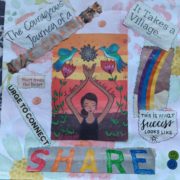5 Intention-setting Ideas to Manifest Radical Self Acceptance as Your New Year Intention
Perhaps, with the advent of the pandemic, this is THE year that we stop setting New Year resolutions that set us up for failure and challenge our mental health and, instead, consider the only intention that will support lasting health, mind, body and spirit – self-acceptance.
When we can truly accept ourselves, both our light and our shadow as a human being, we are in a balanced space to fertilize the soil for continued growth. Self-acceptance will not bring on a superiority complex or make us vain, as those spaces are ones of imbalance, leaning into only our gifts and ignoring or defending our imperfections or limitations. Self-acceptance will lead us away from self-doubt, low self-esteem, low self-worth, and any other spaces that suggest we are less than other. Learning self-acceptance will land you in a place of humility, where you are able to recognize yourself as perfectly imperfect, allowing you to move into spaces of vulnerability to deeply connect with yourself and others. It is in this fertile soil where we can identify parts of ourselves that currently live in the shadows and invite them to sit with us in the light, creating opportunities for growth.
Below I offer ideas you might want to try to support your new year intention of radically accepting yourself exactly as you are now:
- Let Go of Goals. I know, I know, your thinking but how will I know if I am being productive? Setting goals and failing to attain them messes with our mental health. And, even when we meet them, we believe we have to set an even higher goal to achieve, inviting our perfectionist to step forward and carry the load. We have been taught that without goals, we are aimless. That is a myth. Every day we accomplish a lot, like getting out of bed, bathing and feeding ourselves, taking care of our loved ones, laundry, chores, errands, connecting with friends, to name a few. Perhaps consider redefining what we might consider productive. Instead of it meaning completing tasks at work and/or learning a new skill, maybe productive can mean improving relationships by being kind to yourself and others, listening deeply to someone who is struggling, keeping an open mind when someone’s opinion is different than yours or setting a healthy boundary, where you say no, so others can grow. Can you imagine what the world might look like if productive meant this?
- Practice Self-compassion. Self-compassion has been shown to reduce the challenging uncomfortable feelings that we experience when we make a mistake or stumble on our journeys. It is offering ourselves kindness and forgiveness, as we would offer a friend that tells you about a mistake they just made. Unfortunately, we are not taught or shown how to offer ourselves such compassion. The good news is that it can be learned, if we practice. Consider trying some of the free meditations and exercises that can be found at the Center for Mindful Self-Compassion website.
- Lose Control. We spend so much energy trying to control ourselves and everything around us. When we begin to realize there is really not that much we can actually control, life begins to offer us the space to flow with it, instead of against it. One thing I learned that I can control is my breath. Our bodies breathe themselves without much awareness from our minds, leading to a deeper mind-body disconnection. But the diaphragm is actually a skeletal muscle, which means we have control over it. Consider bringing your awareness to your breath the next time you find yourself trying to control a situation, where the mind and body are tight, and allow your mind to lengthen your inhale (through the nose) and lengthen your exhale (through the nose) for the next several breaths. Take notice if the control of your breath (internal experience) satisfies the in-the-moment need to control the external situation. This practice will support a shift away from the need to control so much and ease you into the space of ‘going with the flow’ more.
- Write It Out. Journaling has been shown to assist us in getting clearer about who we really are, by allowing us the space to feel our feelings, and then describing or labeling the emotions and why we might be experiencing them. When we can feel our feelings and label our emotions, we learn that the uplifting ones reflect our needs being satisfied and the heavy ones reflect our needs not being satisfied. Identifying our needs supports the process of getting to know ourselves better. If this effort sounds a bit challenging for you, consider reviewing Marshall Rosenberg’s Feelings Inventory to jump start the process. Then perhaps take a moment to reflect on the last time you might have been experiencing one of the feelings listed under your needs not being met and explore what need was being dismissed or ignored. Again, Marshall Rosenberg provides a Needs Inventory to support this part of the journey. When we can identify our needs (and we all have them!), we are then able to begin the process of radically accepting them for the data they provide about what makes tick.
- Develop Supportive Mantras. Another layer of writing it out includes listing supportive mantras to challenge the critical voice in our minds that believes it is what motivates us to do or be better. Supportive mantras, such as “My needs matter”, “I’m good enough” and “I don’t have to prove my worth to anyone” can stop the critical voice in its tracks. Consider developing a list of such mantras in your journal that challenge your critical voice and keeping it accessible so you can turn to it when the powerful emotions arise and the critical voice gets loud. Powerful emotions are part of being human, yet the critical voice is a different story. When we can befriend our emotions and tune out the critical voice, the road to self-acceptance becomes smoother.
As always, if you try any of these intention-setting ideas for holistic health, I would love to hear about the impact they might have had for you. Please send me an email at linda@sanctuary4compassion.com to share!







